Preparedness
Bug Out Cabin Tips | How To Build The Ultimate Survival Shelter
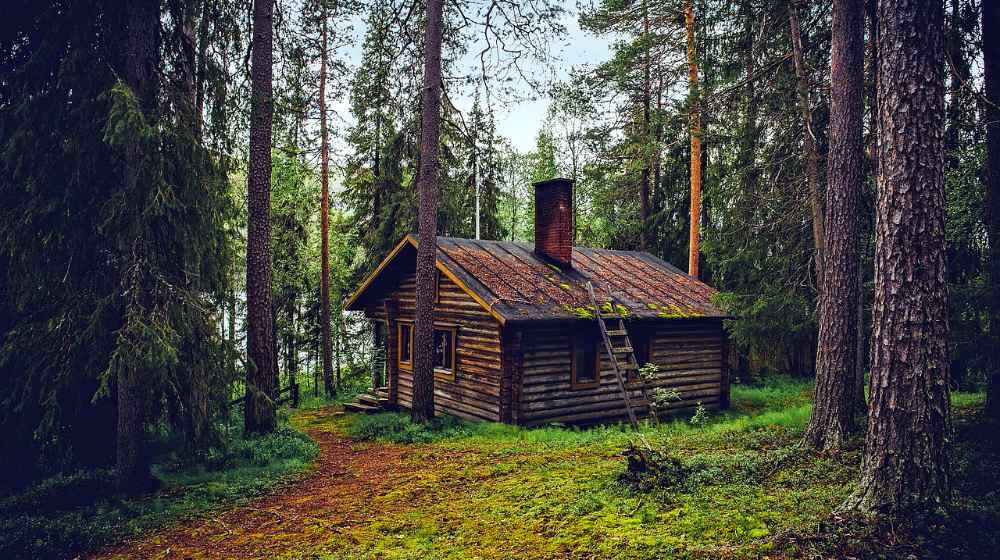
There is probably no stopping your now from building a bug out cabin or a secret survival shelter. With all that's happening around us, anyone can dream of having a place to wait out an SHTF scenario but few get around to doing it. If you have the means and serious desire about having a good contingency plan when SHTF, you should have your own bug out cabin or retreat. If you are dead-set on getting yourself a survival shelter but have no idea how to get started, these tips are just what you need!
What You Need to Know to Build the Ultimate Bug Out Cabin!
Top Tips for Good Bug Out Locations
There may be a multitude of reasons for you to leave home and head for a safer place. It only makes sense to have a survival shelter away from it all; one to get you through rough times especially if your main house is destroyed. Choosing the right location to build your survival retreat is, therefore, a critical decision. Before you dive in too deep, consider these tips for finding the right bug out location.
1. Security of the Location
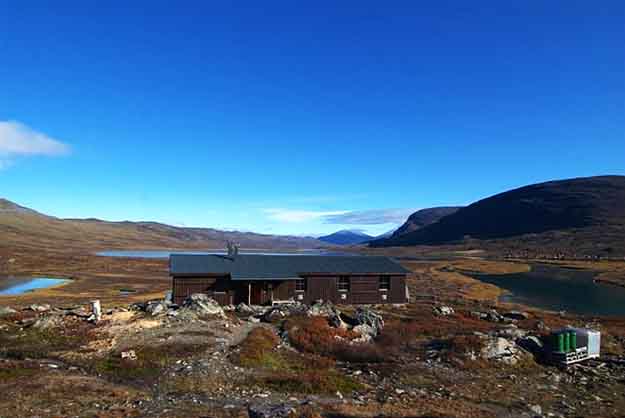
8 Requirements of a Good Bug Out Location Photo by Primal Survivor
Your survival shelter or bug out cabin should be hidden from view. If you have a good spot for an underground bug out shelter, much better. If not, at least see to it that you have a good view of the surroundings. You should be able to see what or who is coming your way. This also makes defending your place easier.
2. Distance to the Location
It is a well-known fact among preppers and survivalists that when you bug out, your cabin or camp should not be easy for others to spot. However, it should not be too far from your home either. Remember that in an emergency situation, time is of the essence. You do not want to get caught up while on your way to safety. Look up the areas or states nearest to your place that are best to bug out.
3. Accessible Water Source
Water is essential to survival so the best bug out spot should have a reliable water source. This is why some of the most recommended locations are located in the mountains, where rivers and streams flow through.
4. Camouflage
Building a super secret survival cabin requires you to work with the environment of the location you picked. There should be vegetation around the area you want your cabin built. The materials you will pick for your building should also match the dominant color of the surroundings.
5. Hygiene
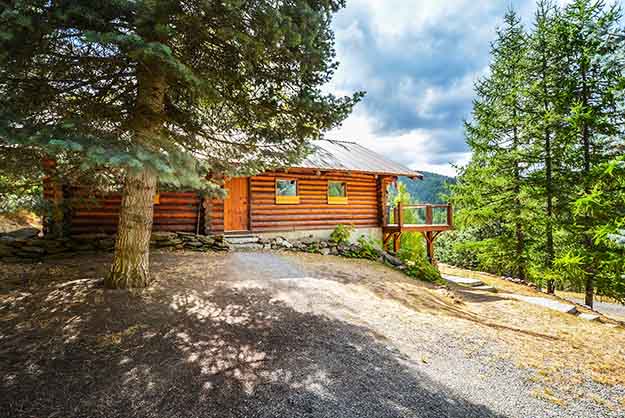
You shouldn't only be safe from economic or natural disaster threats. You should also be safe from diseases and contaminants from a dirty location. This is why low lands and wetlands are a no-no for bug out. You should be able to clean your location easily to maintain hygiene.
6. Climate and Natural Disaster Threats
As we've stated, water is important, so you wouldn't want to bug out in desert or arid areas. If it's too frozen on the other hand, it will be more difficult to maintain a bug out cabin. You also have to forget areas that are too prone to natural disasters. Hawaii, for example, has an active volcanic activity. You might also want to avoid the tornado alley or the hurricane path.
7. Food Source and Production Potential
Now, it is very important to consider food sources when building a bug out cabin. It is good to note that wherever there is a spring or natural water supply, plenty of food sources like fruit-bearing plants and trees can be found. Animals will also be close by. Areas where there are fertile lands are also ideal for growing your own food supply.
8. Best Survival Locations
Considering the previous tips for picking the perfect bug out location, we now point you to the specific states to go when SHTF. Based on the opinion and study of survival experts, the following states are best for bugging out:
- Northern Idaho–The majestic mountains of Idaho and western Montana
- Oregon–One of the best prepper locations
- Ohio–One thing: Amish
- Colorado–The Rocky mountains
- Western Dakota–Less population and low real state prices
- Northern Arizona–The nearest best place to bug out in Southwestern US
- Eastern Kentucky–Appalachian mountains
9. Worst Survival Locations
Based on the opinion and study of survival experts, the following states are worst for bugging out:
- Rhode Island–Too small and too populated
- Wyoming–Too flat and windy
- Florida–Too populated and too many hurricanes
- Texas–Too hot and too open
- Hawaii–Too far and a bad place to be in when SHTF
- California–Too populated and also a bad place to be in when SHTF
- New York–Same as California
Tips for Building a Bug Out Cabin
You know by now building a bug out cabin is not a walk in the park. Heck, it could be a walk in the great big national forests of Alaska! But a well-thought-out bug out cabin plan or design will save you money and a lot of trouble. Here are tips to build an effective bug out cabin.
1. Use T-11 Siding in Construction with Support
Use construction adhesive when using T-11 siding to keep the nails tightly spaced. This will prevent critters from pecking on the siding where bugs can enter.
2. Screen Gable Ends
Be sure to critter-proof your cabin if you don't want your supplies ruined by them. Seal or block those areas either with sheet metal or mesh screens.
3. Minimize Vents and Screen Them Well
A normal house needs to breathe but you can't afford this luxury in a bug out cabin. Any point of access can be used by critters to seek entry into your cabin and destroy it.
4. Seal Rafters Eaves
Another attractive point of access for critters are the rafter eaves. You also have to find ways to seal up or screen the opening.
5. Caulk the Edge of a Metal Roofing
Apply waterproof caulking on a metal roof to avoid freezing and ripping the roof off if water gets accumulated and frozen in the gutter.
6. Locate the Chimney Near a Ridge
A chimney is better located near a ridge to avoid buildup of ice and snow.
7. Seal the Crawl Space
The crawl space is also an entry point for critters and can even be a breeding ground for snakes and other critters. Seal the underside of the floor with a metal sheet or steel mesh.
8. Pressure-Treat Wood Materials
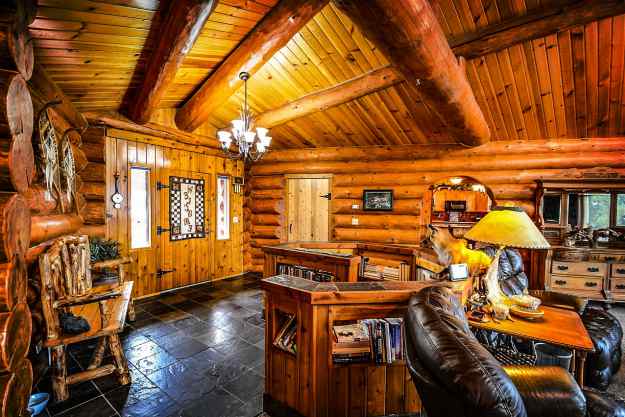
Using pressure-treated wood for your cabin will not only protect it from water damage, it will also make it critter-proof.
9. Secure Your Cabin Entries
Some prowlers can come and seek entry to your cabin. Make that super difficult for them so they will just leave the cabin alone. Frame your shutters and doors in angle iron and carriage bolts. Another layer of doors is also a smart idea.
10. Build Hiding Spots
Even with your reinforcement, some prowlers may still get in. Add built-in hiding places to your place to make it difficult for prowlers to find your supplies.
11. Install Flashing on Roof and Screen All Vents
Use steel roofing and flashing for a sturdy roof over your head. Screen the vents well.
12. Use Sturdy Screws and Metal Fasteners
Use Simpson type metal fasteners and screws instead of ordinary nails for better-supported roofing.
13. Consider a Root Cellar
Let's go old school and opt for a root cellar. Many pioneers survived on their own with a root cellar included in their building plans. Secure its door with a steel frame, too.
14. Add Locks for Security
With a sturdy door, you need to add one more element to keep it inaccessible from unauthorized persons. Use a sturdy padlock and Hasp set for this.
15. Planning for Long-Term
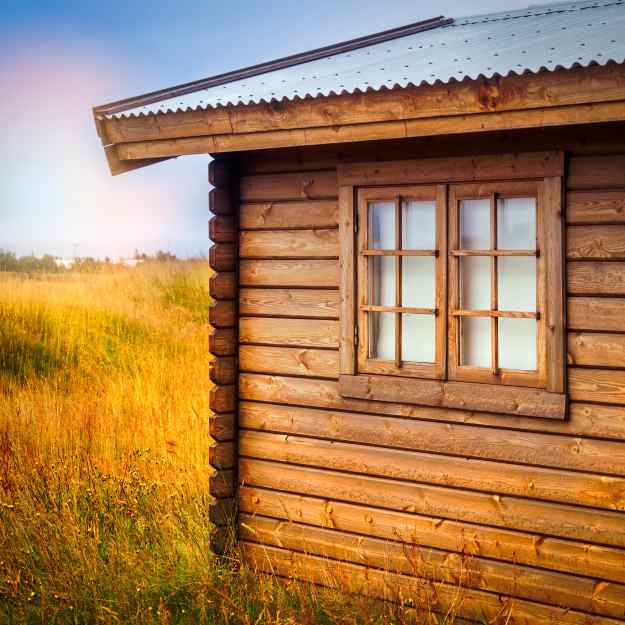
You'll never know how long you are going to wait out a crisis out so you can try to add a few more supplies. Try adding a wood burning stove, an indoor garden, and solar power for a little bit of comfort far out in the woods.
Watch the step-by-step guide on how to build an ultimate bug out cabin in this video from Drop Forged Survival:
A well-planned bug out cabin can help not only you or your family, but a few others you might want to bring along. With these tips and ideas, you can build a bug out cabin and perhaps use it as a wilderness retreat for now. Build a bug out cabin now because who knows when you might need it!
Will you consider these tips for your own bug out cabin project? We're excited to know how your project is working out in the comments section below!
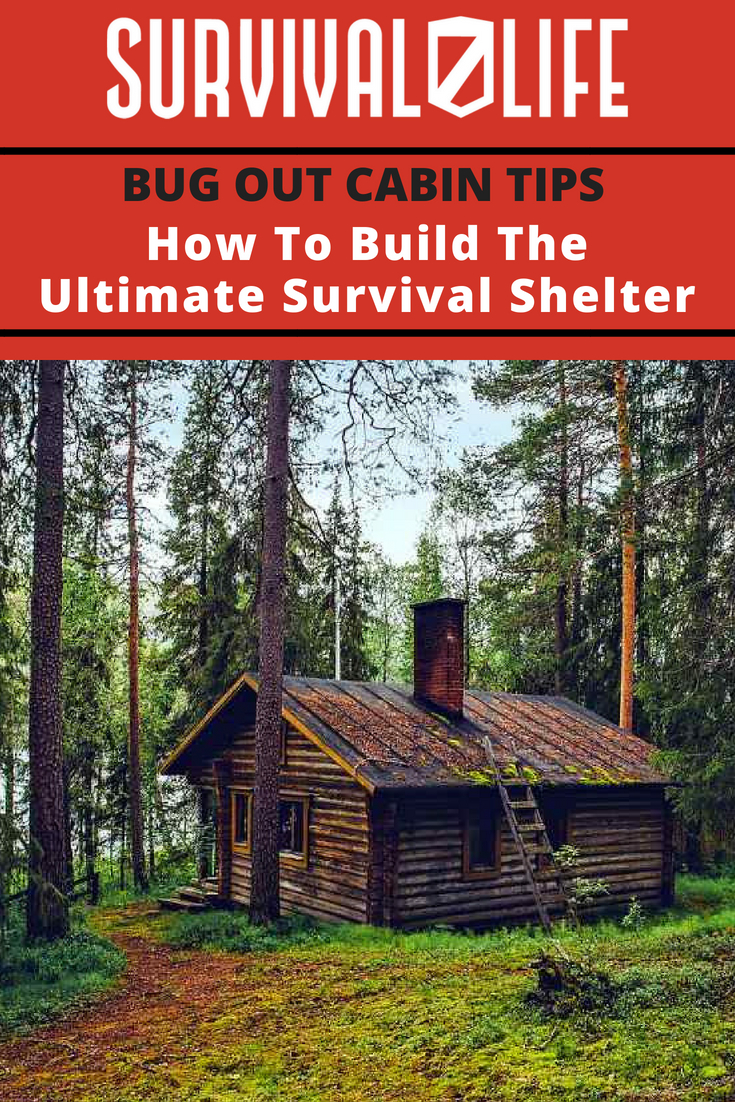
Up Next: How To Build DIY Survival Shelters To Survive Through The Night
For awesome survival gear, you can’t make at home, check out the Survival Life Store!
Follow us on Facebook, Instagram, Twitter, and Pinterest!
Editor’s Note: This post was originally published on October 20, 2014, and has been updated for quality and relevancy.
-

 Paracord Projects11 months ago
Paracord Projects11 months agoParacord Projects | 36 Cool Paracord Ideas For Your Paracord Survival Projects
-

 Paracord Projects1 year ago
Paracord Projects1 year agoHow To Make Paracord Survival Bracelets | DIY Survival Prepping
-

 Medical Care1 year ago
Medical Care1 year ago21 Home Remedies For Toothache Pain Relief
-

 Knife Laws12 months ago
Knife Laws12 months agoAre Switchblades Legal? Knife Laws By State
-

 Do It Yourself1 year ago
Do It Yourself1 year agoSurvival DIY: How To Melt Aluminum Cans For Casting



Pingback: Bug Out Cabin Tips | How to Build the Ultimate Survival Shelter | Survivalist Basics | Be Prepared For Anything!
Nic
January 13, 2015 at 5:54 AM
I have to say the instruction are really comprehensive. I can definitely do this. Thanks for sharing.
Michael Mixon
July 11, 2015 at 8:13 AM
Don’t forget your backup tools! Water will be the most important thing to have in a crisis. Without power to run the well pump, the cleanest water available is likely in your well but it is inaccessible. Check out http://www.emergencywelltube.com for a simple, inexpensive solution to the problem!
vet4freedom
July 26, 2015 at 10:01 AM
when I was in the military , we was tought how to build a shelter out of what you can find in the woods
Clergylady
August 4, 2018 at 6:24 PM
I prefer this plan in the long run but there is no being assured you have time to do it well or have the things you want or need in harsh weather.
There are parts of the nation were living back to the land is more practicle and you could already be doing it. Some areas will always be a struggle to live in. Poor is one thing. Harsh is another.
Decide what you can live with and get to doing. Don’t wait for someday or someday will get away from you. If you get old and have stuff stored up… Pass it on. If you get old and have nothing… That is what you have.. Nothing.
I’m past 70 and have some but not everything I’d like to see in place. I also have the rural place I’ve moved back to in joint tenancy with two sons. Best friends live here now and we help each other out. I’ve avoided city life to the best of my ability most of my adult life.
If I have to leave this in an unforseen circumstance then I’ll have to rely on what is available for shelter but I have small caches across the area and bags I can grab according to circumstance or season. Best scenario is bugging in. 2nd choice is in a vehicle with multiple bags. Last choice is the mountains on foot in winter. Severe cold and snow is hard to disguise a path in. Minus 10 to minus 20 nights is a normal situation. Snow from 0 up to 24 inches falls in normal ranges. Home with food and heat is preferable. Not looking too inviting is more attractive if possible. Growing, raising, and storing edibles is far preferable to hunting in cold weather and you aren’t growing a garden in the mountains in winter.
An expensive cabin is nice but how many seriously can do a really nice 2nd home?
Good advise but do the best you can do. Store tools and supplies. Learn, learn, learn, then learn some more. Plan and practice so you can do things. Stay in the best shape possible. Young or old, survival is hard work. Cultivate a small group of reliable friends with a variety of skills or decide to learn how to do everything :).
Pingback: DIY Super Shelter | Live Like a King in the Outdoors
Pingback: 7 Military Disaster Survival Tips | What To Do When A Military Disaster Strikes
Pingback: Overcoming Cabin Fever With These Indoor Activities
Doug
August 3, 2018 at 8:48 AM
There was a couple in CA a few years back who built their dream home from “pressure treated wood”. They found they could not live in it because of the chemicals used to do the “green treatedwood”. We have a log cabin and every 5/6 years it must be refinished (this involves power spraying, restaining, and a protective coat the sun is tough. Failure to do so will cause the logs to darkened allow insects to burrow, which then means the logs will be attacked by birds going after those tasty morsels-bugs! (National forest cabins built yeas ago are almost black in color and are protected because they used creasote like railroad ties.
‘
Pingback: 7 Military Disaster Survival Tips | Survival Life
Pingback: 7 Military Disaster Survival Tips | Survival Life | Life Off The Grid
Pingback: 7 Military Disaster Survival Tips | Survival Life - Survive!
Pingback: Top Survival Skills | Learn Now, Survive Later | Survivallife
Pingback: 13 Top Survival Skills | Learn Now, Survive Later | Primitive technology
Pingback: 13 Top Survival Skills | Learn Now, Survive Later - Survive!
Pingback: 13 Top Survival Skills | Learn Now, Survive Later – Ultimate Assets
Pingback: Prepare For Economic Collapse | 12 Things You Should Do | Survival Life
Pingback: Ways To Prepare For Economic Collapse | 12 Things You Should Do | Primitive technology
Pingback: Ways To Prepare For Economic Collapse | 12 Things You Should Do – Ultimate Survival Alerts
Pingback: Know Your Fiber: Wild & Edible Plants - Primal Survival
Pingback: Bug Out Locations, Supplies & Resources [PODCAST] – SurvivalHood
Pingback: Bug Out Locations, Supplies & Resources [PODCAST] – The Self-Sufficient Life
Pingback: Bug Out Locations, Supplies & Resources [PODCAST] - Survivalnomics
Pingback: Bug Out Locations, Supplies & Resources [PODCAST] - My Blog
Pingback: Bug Out Locations, Supplies & Resources [PODCAST] - Cooking in Quarantine
Pingback: Bug Out Locations, Supplies & Resources [PODCAST] – Alive After USA Fall
Pingback: Bug Out Locations, Supplies & Resources [PODCAST] – surviveurself
Pingback: Bug Out Locations, Supplies & Resources [PODCAST] | Best Go Bag